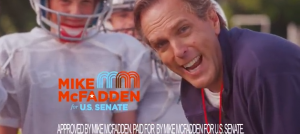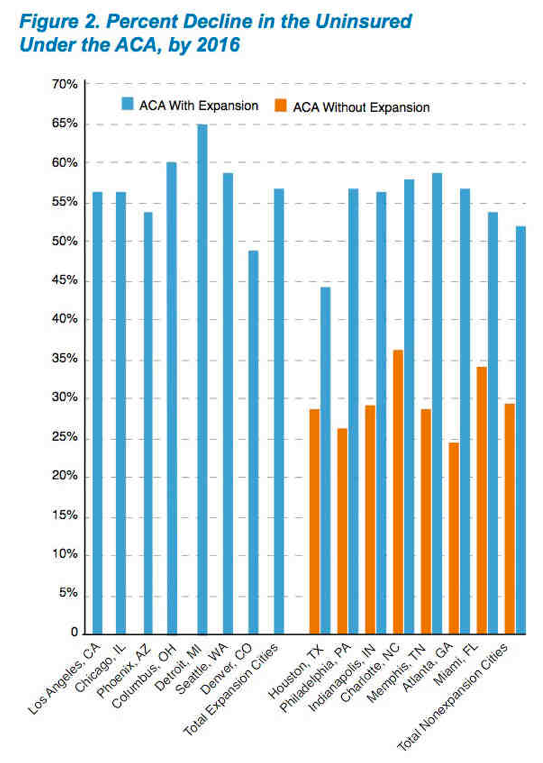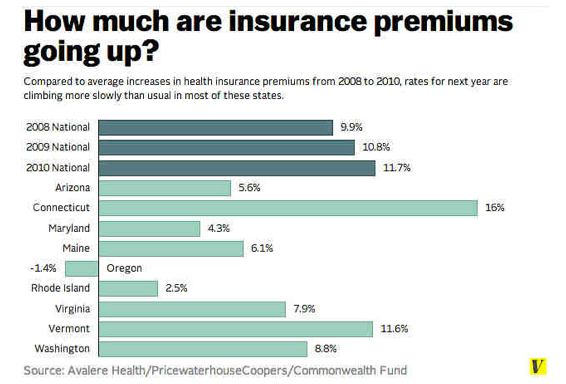For a long time, we’ve been hearing about how Governor Mark Dayton and DFL legislators “soaked the rich” back in 2013. That’s become the conventional wisdom at both the state and national levels, from both liberals and conservatives.
For example, at the national level, Patrick Caldwell from liberal Mother Jones magazine reported that Dayton ran on a “soak-the-rich platform of massively hiking income taxes on the wealthiest people in the state.”
Locally, conservative columnists Joe Soucheray and Katherine Kersten have long been beating the “soak the rich” rhetoricial drum, as has the conservative Pioneer Press editorial board:
“What’s the plan? Tax the rich, then tax the rich again, then tax the rich again?”
Finally, the Chair of the Minnesota House Tax Committee, Greg Davids, is among many conservative state legislators who have used “soak-the-rich” rhetoric to full effect.
Is the “Soak” Rhetoric True?
But did Governor Dayton’s 2013 tax increase on individuals earning over $150,000 and couples earning over $250,000 actually “soak” them in any meaningful way. This chart, derived from the Minnesota Department of Revenue’s 2015 Tax Incidence Study, calls that conventional wisdom into question:
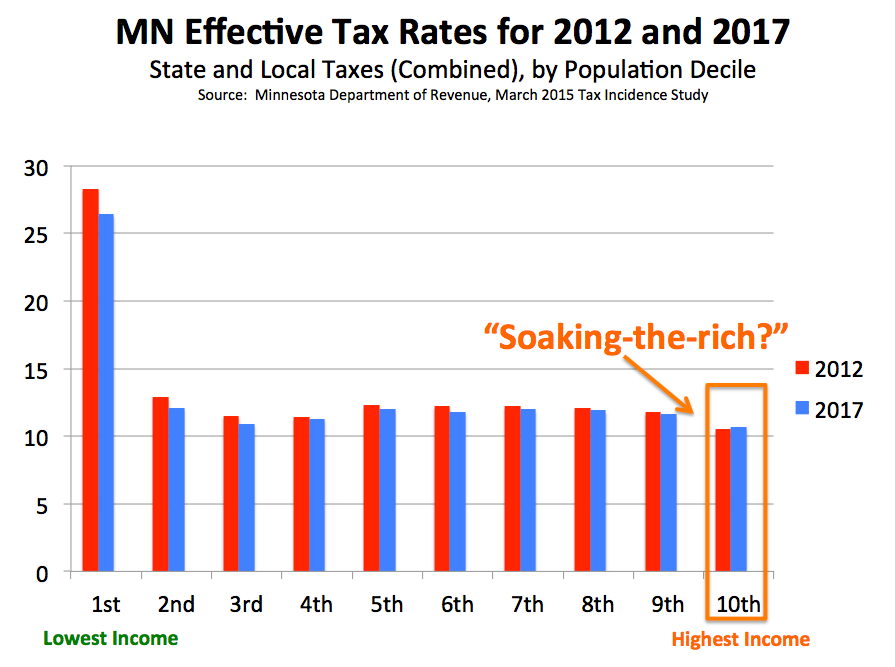
This chart shows that the highest earning Minnesotans will only be paying a slightly higher proportion of their income in state and local taxes in 2017 than they did in 2012, under the rates in place before the 2013 tax increase. In 2012, the highest income Minnesotans were paying 10.5 percent of their income in state and local taxes. By 2017, the projection is that the highest income Minnesotans will see their state and local tax burden inch up to 10.7 percent. This 0.2 percent increase hardly represents punitive “soaking.”
On a somewhat related issue, the chart also shows that the 10 percent of Minnesotans with the highest incomes look to be paying a much smaller share of their income in state and local taxes (10.7 percent) than the decile with the lowest incomes (26.4 percent). However, on this point, the report contains an important caveat about the first decile data (page 17):
“…effective tax rates in the first decile are overstated by an unknown but possibly significant amount.”
But back to my original and primary point, which is not impacted by this caveat: Despite all of the wailing and gnashing about the alleged mistreatment of the highest income Minnesotans, the impact of the Dayton-era tax increase on top earners’ overall state and local tax will be negligible. Higher taxes on top earners didn’t cause the massive job losses that conservatives promised — Minnesota currently has the fifth lowest unemployment in the nation — and they didn’t soak anyone.
Don’t Forget About Local Taxes
How is it that Minnesota’s top earners are paying higher taxes, yet still are paying a lower share of state and local taxes than any other income grouping? Part of the reason is that the top 10 percent will only be paying only 2.2 percent of their income in local taxes in 2017, which is much less than the 3.1 percent share of local taxes that will be paid by the average Minnesotans, and less still than the share of local taxes paid by the lowest-income Minnesotans.
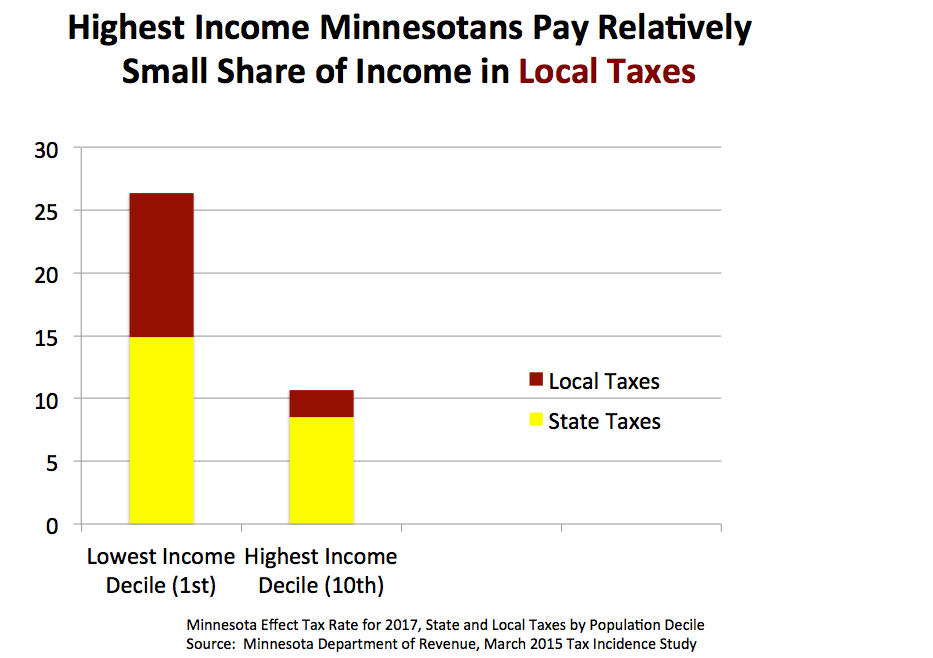 This is a point that is frequently missed, or intentionally ignored, by people who focus solely on state tax burdens, without also taking local tax burdens into consideration.
This is a point that is frequently missed, or intentionally ignored, by people who focus solely on state tax burdens, without also taking local tax burdens into consideration.
So, did Mark Dayton really “soak-the-rich” when he increased taxes by $2.1 billion in 2013? Inflated rhetoric aside, it turns out that the Dayton tax increase was more akin to a light misting than the predicted soaking.
Note: This post was also published in MinnPost.

 The antics of Republican members of the Minnesota State Legislature used to be a
The antics of Republican members of the Minnesota State Legislature used to be a  But to my knowledge, there were no legislators
But to my knowledge, there were no legislators  Minnesota Republicans captured control of the Minnesota House of Representatives in part by fueling urban versus rural resentment: “Those metro-centric DFLers give everything to Minneapolis and St. Paul.” The truth is, turnout trends associated with non-presidential year elections were a
Minnesota Republicans captured control of the Minnesota House of Representatives in part by fueling urban versus rural resentment: “Those metro-centric DFLers give everything to Minneapolis and St. Paul.” The truth is, turnout trends associated with non-presidential year elections were a  Here’s how: About 18% of South Dakotans who currently say they will vote for former Republican U.S. Senator Larry Pressler are making it impossible for second place Democrat Rick Weiland to get enough of the anti-Rounds votes to defeat Rounds. Even though polls consistently show Pressler is running a distant third, some swing voters have been attracted to Pressler, in part because he has promoted himself as the only member of Congress who was cleared during the
Here’s how: About 18% of South Dakotans who currently say they will vote for former Republican U.S. Senator Larry Pressler are making it impossible for second place Democrat Rick Weiland to get enough of the anti-Rounds votes to defeat Rounds. Even though polls consistently show Pressler is running a distant third, some swing voters have been attracted to Pressler, in part because he has promoted himself as the only member of Congress who was cleared during the 
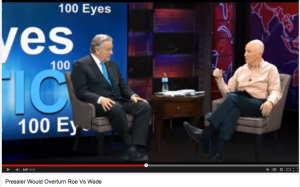
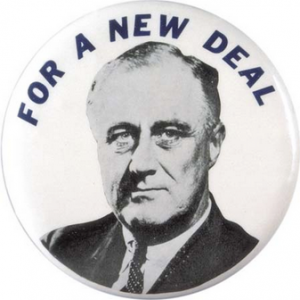 But progressives are also supposed to lead the way forward. The dictionary says a “progressive” is “a person advocating or implementing social reform or new, liberal ideas.”
But progressives are also supposed to lead the way forward. The dictionary says a “progressive” is “a person advocating or implementing social reform or new, liberal ideas.” But there is at least one policymaking unforced error that is making things a bit more difficult for the DFL — the DFLers authorization of a new Senate office building.
But there is at least one policymaking unforced error that is making things a bit more difficult for the DFL — the DFLers authorization of a new Senate office building.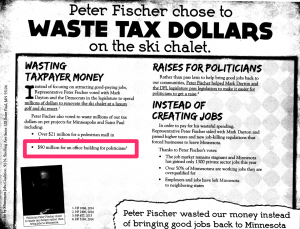 Most voters won’t do a comprehensive financial analysis of whether DFL leaders are doing a good job stewarding their tax dollars. They will judge fiscal stewardship based on an isolated example or two. Republicans are working overtime to make sure that the Senate Office Building is the example voters use to make their judgement.
Most voters won’t do a comprehensive financial analysis of whether DFL leaders are doing a good job stewarding their tax dollars. They will judge fiscal stewardship based on an isolated example or two. Republicans are working overtime to make sure that the Senate Office Building is the example voters use to make their judgement. SEGMENTATION. First, there’s simple electoral math. There are three prominent conservative GOP officeholders on the November ballot — a former GOP state legislator with Tea Party support (Gordon Howie), former GOP Governor (Mike Rounds) and former GOP U.S. Senator (Larry Pressler). That divides South Dakota conservatives in three, which is thrice as nice for the lone Democrat on the ballot.
SEGMENTATION. First, there’s simple electoral math. There are three prominent conservative GOP officeholders on the November ballot — a former GOP state legislator with Tea Party support (Gordon Howie), former GOP Governor (Mike Rounds) and former GOP U.S. Senator (Larry Pressler). That divides South Dakota conservatives in three, which is thrice as nice for the lone Democrat on the ballot.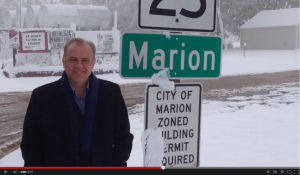

 But I disagreed with him last night when he said it would be “welcome” if Congress supported U.S. attacks on ISIL. It would be more than welcome. It would be necessary.
But I disagreed with him last night when he said it would be “welcome” if Congress supported U.S. attacks on ISIL. It would be more than welcome. It would be necessary. MinnPost reporter Cyndy Brucato is
MinnPost reporter Cyndy Brucato is  Yet when GOP politicians endorse those two mutually exclusive positions, almost no political reporters note the absurdity of it. When reporters allow politicians to get away with simultaneously endorsing the part of Obamacare that outlaws pre-existing condition denials and opposing the part of Obamacare that mandates insurance coverage, they effectively allow those politicians to say something every bit as absurd as “I’m for capitalism, but I also support communism.”
Yet when GOP politicians endorse those two mutually exclusive positions, almost no political reporters note the absurdity of it. When reporters allow politicians to get away with simultaneously endorsing the part of Obamacare that outlaws pre-existing condition denials and opposing the part of Obamacare that mandates insurance coverage, they effectively allow those politicians to say something every bit as absurd as “I’m for capitalism, but I also support communism.” While the findings are a surprise to some veteran political observers, a closer look provides a clue why the relative political newcomer may be showing so strongly. About 78 percent of likely Minnesota voters who say they are supporting Johnson believe that he is either their co-worker (26 percent), neighbor (21 percent), business associate (17 percent), or relative (14 percent).
While the findings are a surprise to some veteran political observers, a closer look provides a clue why the relative political newcomer may be showing so strongly. About 78 percent of likely Minnesota voters who say they are supporting Johnson believe that he is either their co-worker (26 percent), neighbor (21 percent), business associate (17 percent), or relative (14 percent).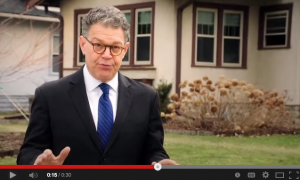
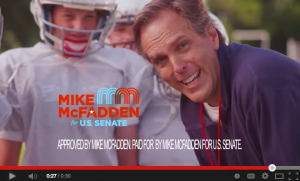

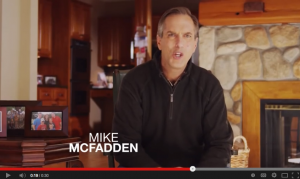 Note the tough, no-nonsense daddy image that McFadden’s political consultants are constructing.
Note the tough, no-nonsense daddy image that McFadden’s political consultants are constructing.  So four years after Target Corporation
So four years after Target Corporation 
 Meanwhile, Rounds’ Democratic opponent Rick Weiland has been campaigning the old fashioned way. He is staying grounded, traveling the dusty byways in a minivan. Weiland is the first candidate in South Dakota history to campaign face-to-face in all of the state’s 311 towns. A couple of them are not metropolises.
Meanwhile, Rounds’ Democratic opponent Rick Weiland has been campaigning the old fashioned way. He is staying grounded, traveling the dusty byways in a minivan. Weiland is the first candidate in South Dakota history to campaign face-to-face in all of the state’s 311 towns. A couple of them are not metropolises.
